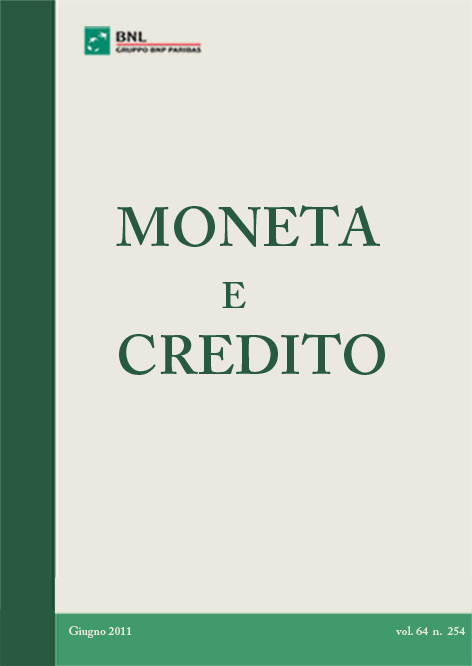Introduzione: la crisi economica e della scienza economica.(Introduction: the Crisis of Economies and of Political Economy)
DOI:
https://doi.org/10.13133/2037-3651/9493Parole chiave:
crisis, uncertainty, mainstream economics, EuropeAbstract
The article introduces to the current issue of the journal by critically reviewing the articles published therein in light of both recent literature and current economic developments. The main topics dealt with concern the role of mainstream economics and ideology in creating the cultural and economic environment that lead to the crisis in the first place and that hinders now an effective policy response to it. Due to its institutional and governance failures, the European Union and the Eurozone in particular are being more affected by the crisis than any other economic area. There, while the recently rescued big financial institutions have started enjoying large profits from trading and speculation again, the sustainability of sovereign debts is being put under pressure due to lack of confidence in the face of severe austerity packages and the associated bleak growth perspectives. Overall, uncertainty concerning the international political and economic environment seem the main hindrance to economic recovery. However, clear strategies to restore confidence and a seemingly stable and ÒcertainÓ economic context are not apparent at the horizon, with the necessary consequence that the financial crisis is most likely to continue exerting strong negative impacts on the real economy for a sustained period.
JEL: G01, B5, E12
Riferimenti bibliografici
ANELLI V. (2011), "Nte bibliografiche: Alacevich M. (2007), Le origini della Banca Mondiale. Una deriva conservatrice, Bruno Mondadori, Milano", Moneta e Credito, vol. 64 n. 253, pp. 75-85.
BOSI P. e D’ADDA C. (2011), "Politiche di sostegno della domanda in presenza di elevato debito pubblico",Moneta e Credito, vol. 64 n. 253, pp. 45-52.
CARLUCCI F. (2011), "Un’analisi quantitativa delle politiche di rientro dal disavanzo pubblico in Italia", Moneta e Credito, vol. 64 n. 254, pp. 135-176.
COZZI T. (2011), "La crisi della macroeconomia", Moneta e Credito, vol. 64 n. 253, pp. 31-44.
DE CASTRO F., PÉREZ J.J. e RODRÍGUEZ VIVES M. (2011), "Fiscal data revisions in Europe", Documentos de Trabajo, n. 1106, Banco de España, Madrid.
D’IPPOLITI C. (2009), "Pensioni e redistribuzione", Mondoperaio, numero 3, maggio 2009, disponibile online alla URL http://www.mondoperaio.it/site/Archivio/323/ DesktopModules/Links/site/368/default.aspx.
FRATIANNI M. e MARCHIONNE F. (2010), "The Banking Bailout of the Subprime Crisis: Size and Effects", PSL Quarterly Review, vol. 63 n. 254, pp. 187-233.
IEO (2011), "IMF Performance in the run-up to the Financial and Economic Crisis: IMF Surveillance in 2004-07",Evaluation report of the Independent Evaluation Office of the International Monetary Fund, disponibile online alla URL: http://www.imf.org
JOSSA B. (2010), Esiste un’alternativa al capitalismo? L’impresa democratica e l’attualità del marxismo, Manifestolibri, Roma.
KREGEL J. (2011), "Resolving the US financial crisis: politics dominates economics in the New Political Economy",PSL Quarterly Review, vol. 64 n. 253, pp. 23-37.
MASERA R. (2010), "Reforming financial systems after the crisis: a comparison of EU and USA", PSL Quarterly Review, vol. 63 nn. 255, pp. 299-362.
MINSKY H.P. (1982), Can ‘it’ happen again? Essays on instability and finance, Sharpe, Armonk.
PASINETTI L.L. (1998), "The myth (or folly) of the 3% deficit/GDP Maastricht ‘parameter’", Cambridge Journal of Economics, vol 22, pp. 117-136.
PASINETTI L.L. (1998), "European Union at the end of 1997: who is within the public finance ‘sustainability’ zone?", Banca Nazionale del Lavoro Quarterly Review, vol. 51 n. 204, pp. 17-36.
PEDONE A. (2011), "Vecchi e nuovi problemi nell’impiego delle politiche di bilancio", Moneta e Credito, vol. 64 n. 253, pp. 53-75.
QUADRIO CURZIO A. (2011), "Economie in crisi: Eurolandia dalla resistenza alla ricostruzione", Moneta e Credito, vol. 64 n. 254, pp. 105-114.
REATI A. (2010), "Perché la teoria post-keynesiana non è dominante", Moneta e Credito, vol. 63 n. 252, pp. 341-363.
RONCAGLIA A. (2010), "Economic policy dilemmas in front of the crisis", PSL Quarterly Review, vol. 63 n. 254, pp. 181-185.
RONCAGLIA A. (2011),"Macroeconomie in crisi e macroeconomie in ripresa", Moneta e Credito, vol. 64 n. 254, pp. 115-133.
RONCAGLIA A. (2011), "Ancora sulla crisi", Moneta e Credito, vol. 64 n. 253, pp. 9-13.
R&S MEDIOBANCA (2011), "Le maggiori banche europee nel 1° settembre 2010 e i piani di stabilizzazione a novembre 2010", disponibile online alla URL: http.//www.mbres.it
SYLOS LABINI P. (2009), "Prospects for the world economy", PSL Quarterly Review, vol. 62 nn. 248-251, pp. 59-86.
TARKIAINEN L., MARTIKAINEN P., LAAKSONEN M. e VALKONEN T. (2011), "Trends in life expectancy by income from 1988 to 2007: decomposition by age and cause of death", Journal of Epidemiology and Community Health, disponibile online all’indirizzo doi: 10.1136/jech.2010.123182.
##submission.downloads##
Pubblicato
Fascicolo
Sezione
Licenza

Ogni materiale pubblicato sul sito e gli articoli pubblicati sulla rivista sono distribuiti con Licenza internazionale Creative Commons Attribuzione - Non commerciale - Non opere derivate 4.0. Copia della licenza è disponibile alla URL http://creativecommons.org/licenses/by-nc-nd/4.0. Gli autori mantengono i diritti sulla loro opera e cedono alla rivista il diritto di prima pubblicazione dell'opera con la licenza suindicata.


